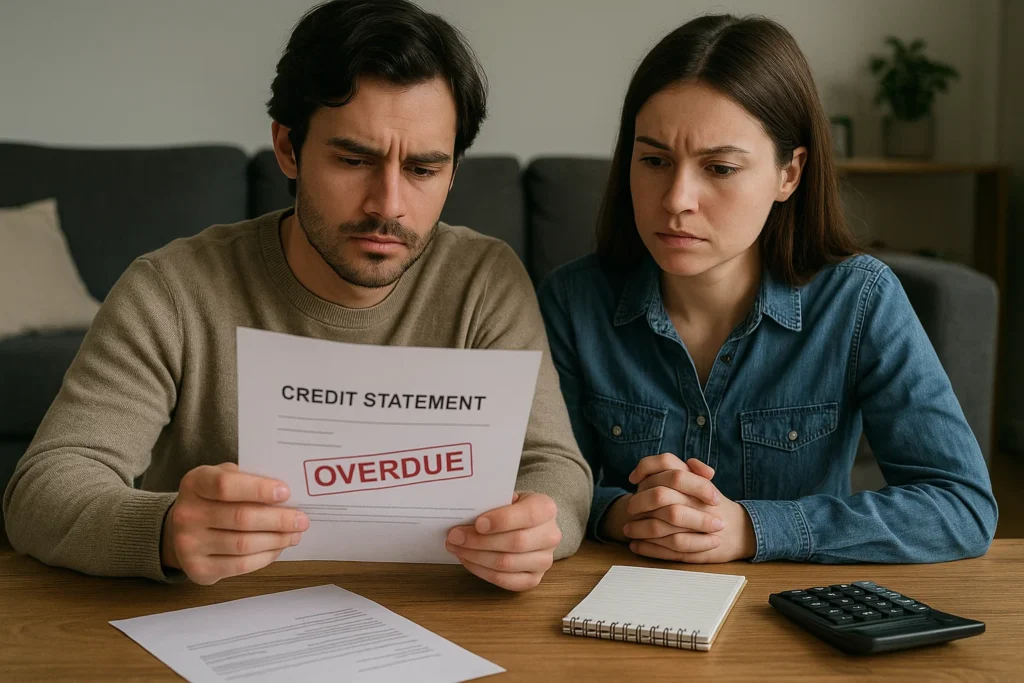If you have recently received a letter, phone call, or text from Past Due Credit, you may be wondering if you really must pay them. The situation can feel confusing, particularly if you do not immediately recognise the debt or are unsure why it has been passed to a collection agency. Past Due Credit are a well-known company in the debt recovery industry and while they can be persistent, it is important to understand that they are not bailiffs. They cannot remove goods from your home but ignoring them can lead to further problems such as court action, county court judgments and even bailiff visits later down the line. Knowing who they are, what their powers involve and what your rights are can make the situation far less daunting.

Who Are Past Due Credit Solutions?
Past Due Credit Solutions are an FCA regulated debt collection agency that works on behalf of banks, energy suppliers, telecoms companies and other private companies. In some cases, they purchase debts outright and try to recover the balance in full. In others, they simply collect on behalf of the original creditor. If they are contacting you, it means the organisation you owe money to has either sold or passed your account across for recovery.
It is vital to note that Past Due Credit are not enforcement agents. They do not have the same powers as a county court bailiff or a high court enforcement officer. Their role is to request repayment and negotiate on behalf of creditors. However, if they do not secure a repayment, the matter can be taken to the county court, where a judge may issue a county court judgment against you.
Why Have They Contacted Me?
There are many reasons you might hear from Past Due Credit. They handle debts linked to credit cards, loans, overdrafts, energy bills, mobile phone contracts and even unpaid council tax passed on by a local authority. Their letters can be alarming, but in most cases they are simply informing you that you have an outstanding balance that needs resolving.
If you are unsure about the debt, you are entitled to request proof of the balance and details of the original credit agreement. If they cannot provide this information, you have the right to dispute the claim. However, if the debt is legitimate and remains unpaid, further enforcement may follow through the county court, which could eventually involve bailiffs.

Past Due Credit vs Bailiffs – What’s the Difference?
It is common for people to mistake Past Due Credit for bailiffs, the difference is significant. Debt collection agencies like Past Due Credit cannot enter your home, seize belongings, or enforce repayment through physical means. Their powers are restricted to contacting you by phone, email, or letter.
Bailiffs, also known as enforcement agents, have far greater authority. Once a county court judgment is issued and enforcement is approved, a certificated enforcement agent can carry out bailiff visits to your home. They may ask you to enter into a controlled goods agreement, which allows them to list and take control of certain possessions until payment is made. In more serious cases involving fines, a civilian enforcement officer or a family court bailiff may be tasked with enforcing the debt. Larger cases that escalate through the High Court may even involve a high court enforcement officer.
Understanding these differences is crucial. Past Due Credit can pressure you, but they cannot act like bailiffs. However, leaving them unresolved could lead to the courts granting enforcement powers to others who can.
What Happens If I Ignore Past Due Credit?
Ignoring Past Due Credit is rarely a good idea. At first, the company will increase their letters, calls and messages. If no arrangement is made, your creditor can issue court documents to begin legal proceedings. This may lead to a county court judgment requiring you to pay.
Once a judgment is issued, the debt becomes legally enforceable. If you still do not pay, the court may authorise enforcement action. That could mean a county court bailiff being instructed to visit your home. For larger sums, a creditor may escalate the case to a high court enforcement officer. In situations involving unpaid criminal fines, a civilian enforcement officer has powers to enforce repayment. In family matters, a family court bailiff may be used to collect on court-ordered payments such as maintenance or a community penalty order.
At this stage, the consequences become much more serious. Bailiffs may attempt entry, although the rules are strict. They cannot usually force entry, but there are exceptions. In certain cases such as unpaid fines, bailiffs may be allowed to use bailiff law that grants them authority to enter by force. This is why dealing with Past Due Credit before matters reach the enforcement stage is always the better option.

Your Rights When Dealing with Debt Collectors
Even though Past Due Credit are not bailiffs, they are regulated by the Financial Conduct Authority. This means they must act fairly, treat customers with respect and avoid aggressive practices. They cannot mislead you about their powers or claim to be enforcement officers when they are not. You also have the right to ask for proof of the debt and request that all communication is put in writing.
If you believe they are behaving unfairly or need independent support, Citizens Advice can provide free guidance on how to deal with them. Seeking early debt advice is always a good step, as it allows you to understand all your options and prevents the stress of escalating letters and court documents.
What Bailiffs Can Do if It Reaches Enforcement
If Past Due Credit pass your account back to your creditor and the case ends up in court, you may eventually face bailiff visits. A certificated enforcement agent could come to your property to collect goods or request entry. The most common outcome is a controlled goods agreement, where items are listed but not removed if payments are made.
There are limits to what bailiffs can do. They cannot remove essential furniture, clothing, or tools needed for work. They are not allowed to harass you or enter your home without proper authority. However, they may be able to clamp or remove vehicles, particularly if they are not under hire purchase. While force entry is usually not permitted for consumer debts, there are exceptions under bailiff law where it can be authorised. This shows the importance of acting before matters reach enforcement.

How to Stop Past Due Credit Debt Collectors
The best way to stop Past Due Credit from contacting you is to take control of the debt. Some people can arrange a payment plan directly with them. For some people, the amount they owe is simply too high to manage, particularly when there are multiple debts. In these situations, a formal debt solution is often the most effective option.
An Individual Voluntary Arrangement (IVA) is one formal debt solution. It enables you to make a single affordable monthly payment towards your unsecured debts under a legally binding agreement. Once the IVA is approved, creditors included in the arrangement cannot take further enforcement action, protecting you from bailiff visits. Interest and charges on these debts are usually frozen, and at the end of the term, any remaining unsecured balances may be written off. This provides a structured way to manage your debts and the reassurance that enforcement action will not continue hanging over you.
Seeking professional debt advice is the first step. It ensures you understand your options, whether that is negotiating directly, challenging the debt, or entering a formal solution. Guidance from our experts at My Debt Plan makes the process clearer and far less stressful.
Why My Debt Plan Is the Safer Option
Facing letters from Past Due Credit can leave you feeling trapped, but you are not alone. At My Debt Plan, we specialise in helping people who are under pressure from debt collectors and creditors. We ensure that your rights are protected and that you find a solution tailored to your situation.
Our team can help you avoid the escalation of matters to the county court, prevent the involvement of enforcement agents and ensure that you are no longer at risk of bailiff visits. With one affordable monthly payment, you can take back control and stop worrying about court documents, enforcement, or the threat of bailiffs arriving at your door.

Taking the Next Step
If you have been contacted by Past Due Credit, do not ignore it. The sooner you act, the more choices you have. By dealing with the debt early, you avoid the risk of a county court judgment, the stress of enforcement, and the worry of losing control of your possessions.
Speak to My Debt Plan today for free and confidential debt advice. Our team can guide you through the options available, helping to reduce the stress of constant letters and calls while protecting you from enforcement action. Together, we’ll work towards a solution that eases the pressure and supports you in rebuilding your financial stability.






